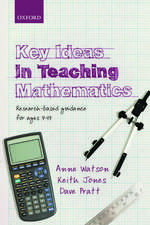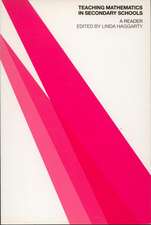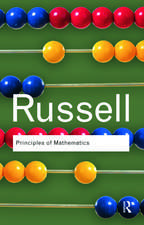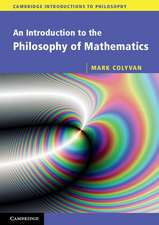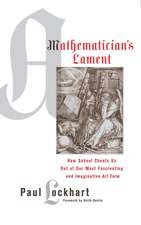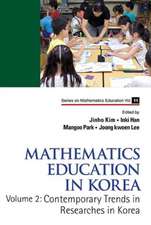Epistemological Foundations of Mathematical Experience: Recent Research in Psychology
Editat de Leslie P. Steffeen Limba Engleză Paperback – 17 sep 1991
Din seria Recent Research in Psychology
- 15%
 Preț: 632.37 lei
Preț: 632.37 lei -
 Preț: 379.86 lei
Preț: 379.86 lei - 15%
 Preț: 637.13 lei
Preț: 637.13 lei -
 Preț: 377.73 lei
Preț: 377.73 lei - 15%
 Preț: 631.40 lei
Preț: 631.40 lei -
 Preț: 382.36 lei
Preț: 382.36 lei - 15%
 Preț: 635.65 lei
Preț: 635.65 lei - 15%
 Preț: 642.36 lei
Preț: 642.36 lei - 15%
 Preț: 634.18 lei
Preț: 634.18 lei -
 Preț: 392.60 lei
Preț: 392.60 lei - 15%
 Preț: 637.59 lei
Preț: 637.59 lei - 15%
 Preț: 635.65 lei
Preț: 635.65 lei - 15%
 Preț: 634.49 lei
Preț: 634.49 lei - 15%
 Preț: 645.47 lei
Preț: 645.47 lei - 20%
 Preț: 440.22 lei
Preț: 440.22 lei - 15%
 Preț: 653.33 lei
Preț: 653.33 lei - 5%
 Preț: 712.60 lei
Preț: 712.60 lei - 15%
 Preț: 634.68 lei
Preț: 634.68 lei - 18%
 Preț: 950.96 lei
Preț: 950.96 lei - 15%
 Preț: 639.59 lei
Preț: 639.59 lei - 15%
 Preț: 634.00 lei
Preț: 634.00 lei - 15%
 Preț: 636.80 lei
Preț: 636.80 lei - 18%
 Preț: 724.00 lei
Preț: 724.00 lei - 15%
 Preț: 635.15 lei
Preț: 635.15 lei - 15%
 Preț: 639.08 lei
Preț: 639.08 lei - 15%
 Preț: 638.76 lei
Preț: 638.76 lei - 15%
 Preț: 640.55 lei
Preț: 640.55 lei - 15%
 Preț: 637.28 lei
Preț: 637.28 lei - 15%
 Preț: 630.57 lei
Preț: 630.57 lei - 15%
 Preț: 636.80 lei
Preț: 636.80 lei - 15%
 Preț: 638.57 lei
Preț: 638.57 lei - 15%
 Preț: 633.02 lei
Preț: 633.02 lei - 15%
 Preț: 647.08 lei
Preț: 647.08 lei - 15%
 Preț: 638.43 lei
Preț: 638.43 lei - 15%
 Preț: 649.71 lei
Preț: 649.71 lei - 15%
 Preț: 637.93 lei
Preț: 637.93 lei - 15%
 Preț: 634.18 lei
Preț: 634.18 lei - 15%
 Preț: 632.37 lei
Preț: 632.37 lei -
 Preț: 376.80 lei
Preț: 376.80 lei - 15%
 Preț: 644.18 lei
Preț: 644.18 lei - 15%
 Preț: 640.55 lei
Preț: 640.55 lei - 15%
 Preț: 637.78 lei
Preț: 637.78 lei -
 Preț: 377.57 lei
Preț: 377.57 lei - 15%
 Preț: 635.15 lei
Preț: 635.15 lei - 18%
 Preț: 946.87 lei
Preț: 946.87 lei - 15%
 Preț: 647.27 lei
Preț: 647.27 lei - 15%
 Preț: 633.53 lei
Preț: 633.53 lei
Preț: 642.18 lei
Preț vechi: 755.51 lei
-15% Nou
Puncte Express: 963
Preț estimativ în valută:
122.90€ • 127.83$ • 101.46£
122.90€ • 127.83$ • 101.46£
Carte tipărită la comandă
Livrare economică 15-29 aprilie
Preluare comenzi: 021 569.72.76
Specificații
ISBN-13: 9780387976006
ISBN-10: 0387976000
Pagini: 312
Ilustrații: XVII, 312 p.
Dimensiuni: 155 x 235 x 18 mm
Greutate: 0.47 kg
Ediția:Softcover reprint of the original 1st ed. 1991
Editura: Springer
Colecția Springer
Seria Recent Research in Psychology
Locul publicării:New York, NY, United States
ISBN-10: 0387976000
Pagini: 312
Ilustrații: XVII, 312 p.
Dimensiuni: 155 x 235 x 18 mm
Greutate: 0.47 kg
Ediția:Softcover reprint of the original 1st ed. 1991
Editura: Springer
Colecția Springer
Seria Recent Research in Psychology
Locul publicării:New York, NY, United States
Public țintă
ResearchCuprins
1 Philosophical and Psychological Aspects of Constructivism.- Foundationalism and Constructivism.- Psychological Constructivism.- Foundations Revisited.- Overview of Chapters.- 2 The Import of Fodor’s Anti-Constructivist Argument.- Fodor’s Argument.- Reconstructing the Argument.- What’s Wrong with Contemporary Models of Representation?.- Why Should We Care?.- Interactivism: Outline of a Solution.- Conclusions.- 3 The Learning Paradox: A Plausible Counterexample.- A Guiding Analogy.- An Example of the Learning Paradox.- A Weak Form of the Innatist Hypothesis.- Learning the Initial Number Sequence.- A More General Reformulation of Learning.- Final Comments.- 4 Abstraction, Re-Presentation, and Reflection: An Interpretation of Experience and Piaget’s Approach.- Reflection.- Abstraction.- Re-Presentation.- The Power of Symbols.- Piaget’s Theory of Abstraction.- Form and Content.- Scheme Theory.- Four kinds of Abstraction.- The Question of Awareness.- Conclusion.- Philosophical Postscript.- 5 A Pre-Logical Model of Rationality.- Rationality as Logic.- Some Thoughts About Thought.- The Nature of Rationality.- The Necessity of Rationality.- The Rationality of Rationality.- The Rationality of Necessity.- The Nurturance of Rationality.- Conclusion.- 6 Recursion and the Mathematical Experience.- What is Recursion?.- What Contributes to Children’s Mathematical Experience?.- Mathematical Knowledge Building as a Recursive Activity.- Summary.- 7 The Role Mathematical Transformations and Practice in Mathematical Development.- Transfer Problem Illustration.- Plan of Chapter.- Acquiring Mental Maps as a Metaphor for Interactive Knowing.- Infant Number Skills.- Addition and Subtraction.- Preschoolers’ Understanding of One-to-One Correspondence.- Children’s Acquisition ofSome Algebraic Manipulations.- Summary and Conclusions.- 8 The Concept of Exponential Functions: A Student’s Perspective.- The Traditional Account of Exponential Expressions and Exponential Functions.- Method.- Results.- Conclusions.- Discussion: Implications of Findings for Mathematics Education.- 9 Constructive Aspects of Reflective Abstraction in Advanced Mathematics.- Mathematical Knowledge and its Acquisition.- The Constructive Aspect of the Reflective Abstraction.- My Research Program.- Specific Mathematics Topics.- 10 Reflective Abstraction in Humanities Education: Thematic Images and Personal Schemas.- Piaget, Education, and Hermeneutics.- Reflective Abstraction of “Being Romantic”.- Equilibration and the Cognitive Compensations.- An Integrated Guiding Image.- 11 Enhancing School Mathematical Experience Through Constructive Computing Activity.- Aspects of Significant School Mathematics Experiences.- Experiential Aspects of Constructive Computing Activities.- Summary.- 12 To Experience is to Conceptualize: A Discussion of Epistemology and Mathematical Experience.- Construction of Mathematical Thought.- Curriculum and Pedagogy.- Methodology.- Mathematics Education as Paideia.- Postscript.- References.- Author Index.
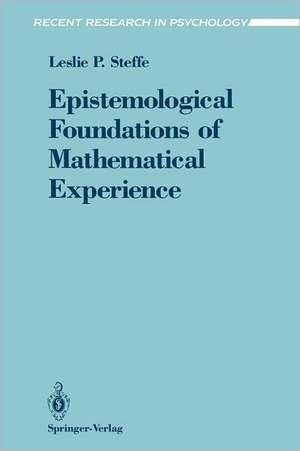
![Maths Frameworking -- Pupil Book 3.1 [Third Edition]](https://i2.books-express.ro/bt/9780007537778/maths-frameworking-pupil-book-3-1-third-edition.jpg)




